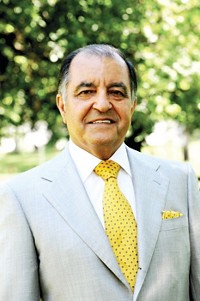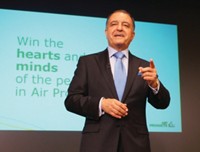Advertisement
Grab your lab coat. Let's get started
Welcome!
Welcome!
Create an account below to get 6 C&EN articles per month, receive newsletters and more - all free.
It seems this is your first time logging in online. Please enter the following information to continue.
As an ACS member you automatically get access to this site. All we need is few more details to create your reading experience.
Not you? Sign in with a different account.
Not you? Sign in with a different account.
ERROR 1
ERROR 1
ERROR 2
ERROR 2
ERROR 2
ERROR 2
ERROR 2
Password and Confirm password must match.
If you have an ACS member number, please enter it here so we can link this account to your membership. (optional)
ERROR 2
ACS values your privacy. By submitting your information, you are gaining access to C&EN and subscribing to our weekly newsletter. We use the information you provide to make your reading experience better, and we will never sell your data to third party members.
Business
Seifi Ghasemi recounts his path to the helm of Air Products
Palladium Medal winner talks about the U.S., his management style, and taking chances
by Marc S. Reisch
May 24, 2017
| A version of this story appeared in
Volume 95, Issue 22
Seifi Ghasemi, chair, president, and chief executive officer of the industrial gases firm Air Products & Chemicals, is 72 years old. But to explain who he is today, he tells a story about an experience he had as a 12-year-old schoolboy in northeastern Iran.
Hard-boiled executives don’t often choke up when they speak to reporters. That’s especially true of those who have held major leadership roles in large industrial operations, as Ghasemi has.
But the dapper and personable Ghasemi wasn’t embarrassed at all to recall a presentation he attended when the shah still ruled Iran, a country then allied with the U.S. That presentation, by U.S. information service visitors to Ghasemi’s school, described the U.S. as a land of opportunity that offered freedom of religion, freedom of expression, and a democratic form of government.
“I just fell in love with the country,” Ghasemi recalls. “After that presentation, I was determined I would be going to America one day. I read everything I could about the country.”
Ghasemi not only realized his dream of coming to the U.S., but also he excelled in the States, driven both by his passion for knowledge and success and by his willingness to take chances. Along the way he developed a decisive management style that depends in large part on motivating the people around him to succeed.
Vitals
Age: 72
Birthplace: Mashhad, Iran
Education: B.S., Abadan Institute of Technology, 1966; M.S., Stanford University, 1969
Professional highlights: Chair, president, and CEO, Air Products, 2014–present; chair, Versum Materials, 2016–present; chair and CEO, Rockwood Holdings, 2001–2014; leadership positions, GKN, 1997–2001; leadership positions, BOC, including president, BOC Americas, 1978–1997; executive director, National Iranian Steel Industries, 1975–1978
Best piece of advice: “Life is about risk. If you take the risk, you might win or you might lose. If you don’t take the risk, you always lose.”
To recognize these accomplishments as well as his contributions to the chemical industry, the Société de Chimie Industrielle will award Ghasemi the International Palladium Medal at a dinner in his honor in New York City on June 1. Twenty-eight CEOs, including retired DuPont CEO Ellen Kullman and Dow Chemical’s Andrew N. Liveris, have received the biennial award from the industry education group.
Ghasemi first came to the U.S. as a graduate student at Stanford University, where he received his master’s degree in mechanical engineering. Along the way, he says, he also took classes in business and law “because I was interested.”
But when Ghasemi started work on his Ph.D. at Stanford, he met a young woman from upstate New York studying psychology. “You know how it is at college,” he says. “You meet people, you fall in love. And then we decided to get married. So I said I better look for a job and did not finish my Ph.D.”
Ghasemi says he got his ideal first job with Bill Lear, the founder of the business jet manufacturer that carried his name. Working for Lear, the young mechanical engineer was given the quixotic task of designing a steam-powered automobile engine. “I got a patent for him on that engine. I was very happy and was paid a lot of money,” he says.
But then Ghasemi’s wife, a partner whose counsel he says he counts on to this day, suggested they go back to Iran, figuring he might have opportunities in his native country that he wouldn’t immediately have in the U.S.
Ambitious, Ghasemi took up his wife’s challenge and soon found himself working to establish a steel industry in Iran. He eventually wound up with the job of building National Iranian Steel Industries. “We engaged 120 contractors from 70 countries around the world,” Ghasemi says. “It was a very exciting job. Probably the biggest job I’ve ever done.”
All told, Ghasemi figures, the Iranian government invested $25 billion in current dollars to build the company. Along the way he also got a thorough education in the industrial gases business because of the need for oxygen in the steel-making process.
But when Islamic revolutionaries overthrew the shah’s government in 1978, Ghasemi had to flee for his life. “I lost everything,” he says. Although he is reticent on the details of his escape, he says his wife and young son were in the U.S. at the time.
He was reunited with his family in Paris in April 1979. They returned to the U.S., where he quickly found a job with Airco. That firm was soon bought by industrial gases company BOC, where he rose to be president of BOC’s Americas unit. Ghasemi was in line to become CEO of BOC, but he was passed over and instead joined the British aerospace and auto parts maker GKN.
Although he was familiar with industrial gases and the chemical sector it serves, Ghasemi might not have become so deeply involved in the two businesses if, while still at GKN, he hadn’t answered a headhunter’s call to meet Henry Kravis, head of the private equity firm Kohlberg Kravis Roberts & Co.
“They kind of seduced me,” Ghasemi recalls. He joined KKR in 2001 to build its Rockwood Holdings unit into a large, multinational chemical firm. Under his leadership, the firm grew from $750 million in annual sales to $4 billion and amassed operations in ceramics, lithium chemicals, titanium dioxide, and pharmaceutical intermediates.
The firm went public in 2005 at $20 per share and was sold for $85 per share, or $6.2 billion, in 2014. The price, paid by Albemarle, “was too difficult to say no to,” Ghasemi says.
In 2013, Ghasemi joined the board of Air Products as the firm was being pressed by the investment firm Pershing Square Capital Management to make managerial and financial changes. In July 2014, he became Air Products’ CEO.
At Air Products, Ghasemi has culled operations to focus on industrial gases. Since 2014, the firm sold its specialty chemical business to Evonik Industries for $3.8 billion and spun off its electronic chemicals operations, now known as Versum Materials, to shareholders.
How could he successfully operate Rockwood as a collection of businesses but then decide Air Products needed to be slimmed down to industrial gases alone? At Rockwood, he says, “we had a holding company structure. Each business is totally focused on what it does, and there is no interaction between the companies.”
The problem with conglomerates is “they try to integrate everything,” figuring, for instance, that doing so makes it easier to conduct an audit. “So you save $2 million in audit costs, but in the meantime you are creating a big bureaucracy,” Ghasemi says.
Air Products was just such a big company without a focus when he joined, Ghasemi argues. By selling off specialties and spinning off electronics “we created a lot of cash for Air Products, and now the industrial gas business can go and get focused.”
What Ghasemi did with Air Products is counter to the long-term trend toward industry consolidation, a trend that is not necessarily a good thing, he says. “Consolidation only creates bigger companies which are more difficult to run. I am not a big fan of size for the sake of size.”
What’s important, Ghasemi says, is for a firm’s leader to identify its core competency. A CEO also needs to explain the company’s goals to employees and must “commit his life to the job.”
Ghasemi says only in the U.S. could he have come by those hard-won insights. “No one looked at my background. I was not a member of some inner circle. I worked hard, and I was given a chance because this country and its businesses operate as meritocracies.”
Ghasemi is still inspired by the country he learned about when U.S. information service officers visited his school 60 years ago. “We have a great country, and I think we need to be very cautious that we don’t change that,” he says.






Join the conversation
Contact the reporter
Submit a Letter to the Editor for publication
Engage with us on Twitter